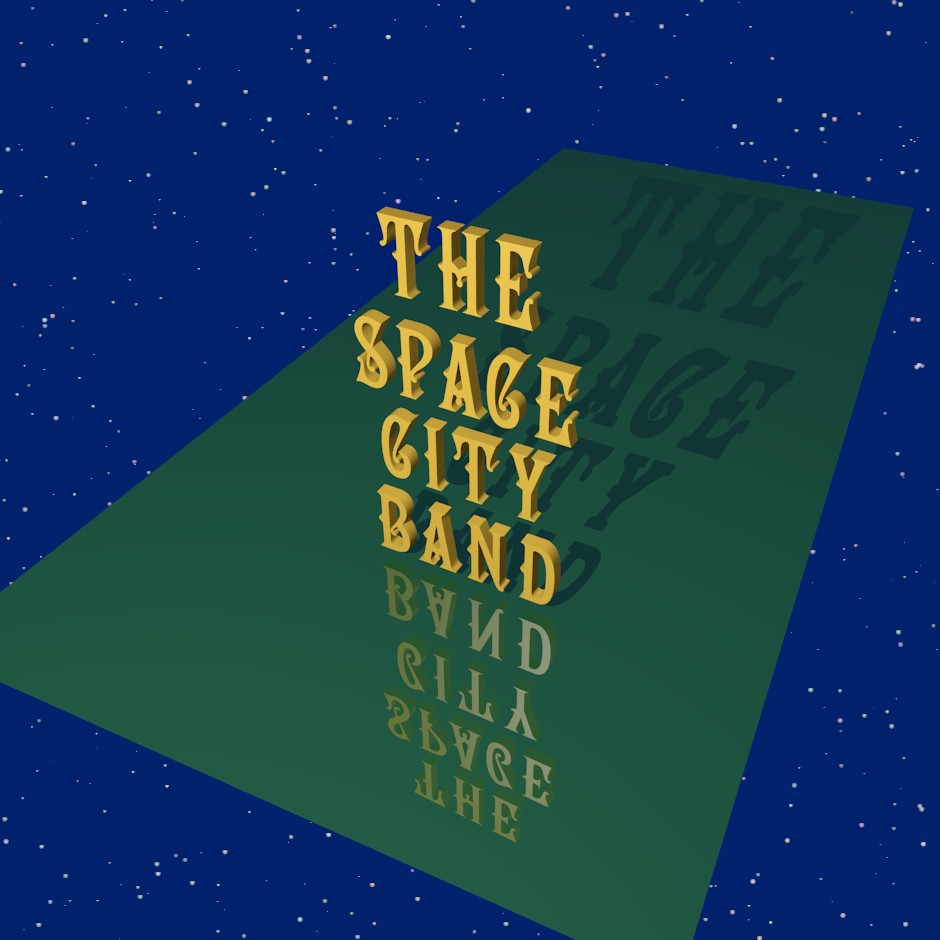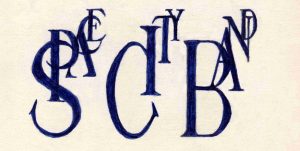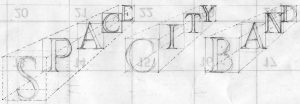
Click on the mp3 player to play
| Title |
mp3 Audio |
Soloist |
| Steel-Guitar Rag |
|
Dave Holland |
| Goin’ Back To Lousianna |
|
Dave Holland |
| Child’s Anthem |
|
Space City Band |
| Pornographic Queen |
|
Danny Wilder |
| Sent For You Yesterday, And Here You Come Today |
|
Dave Holland |
| Six Days On The Road (And I’m Going to Make It Home Tonight) |
|
Dave Holland |
| Can’t Win For Losin’ |
|
Danny Wilder |
| A Tune I Just Can’t Change |
|
Phillip Howell |
| Shame On The Moon |
|
Phillip Howell |
| Take Me Back |
|
Phillip Howell |
| Big Band Medley |
|
Space City Band |
| Dirty Laundry |
|
Bobby Shepard |
| I Found Somebody |
|
Bobby Shepard |

Early Space City Band Logo
I joined the Space City Band to play keyboards with them at the Fog-Cutter Restaurant in Huntsville, AL, USA, sometime in 1982. I had worked there for a number of months before my 30th birthday, which usually falls in December. It was a great period — great crowds, great and supportive management, and great band members as colleagues (Roberta Silva, Danny Wilder, Phillip Howell, Bobby Shepard, and Dave Holland) who were all accomplished musicians and were great to work with. Things continued well there until we had an offer that interested us — to move to another of the city’s upscale venues, for a sizable raise. All was set until one of the band-members decided to make a deal on their own to stay. By the time that everything finally hit the fan, the job we had been offered was no longer available to us without the holdout. And, we no longer had our job at the Fogcutter…
This was when the band retreated to a small, unnamed Huntsville club for two weeks and never received our pay. We didn’t continue to work there.
So it was when we went to the Ramada Inn in Attalla and recorded the songs published here. Attalla, AL is a small town close to Gadsden, AL that just happens to be the hometown of my ex-wife. But, I digress… On a humorous note, the Wikipedia article for Attalla, AL formerly described its geography as being, “located south of hell and the farthest possible place away from anywhere civilized…” This has been edited to list a number of other rather obscure places that are proximal.
 We hired a replacement for the departed band member. But, unfortunately this person does not appear on any of these Attalla recordings. I am not certain why. I have published all of these tunes on facebook, one-by-one. And, I still have several to post. However, I decided to collect them here – into a single location for anyone inclined to listen.
We hired a replacement for the departed band member. But, unfortunately this person does not appear on any of these Attalla recordings. I am not certain why. I have published all of these tunes on facebook, one-by-one. And, I still have several to post. However, I decided to collect them here – into a single location for anyone inclined to listen.
Our last Attalla performance was my last one with the Space City Band. I have presented these songs in the order that I originally posted them.
The first song, Steel Guitar Rag and all the others featured here, were originally recorded by me, onto (TDK-SA) cassette tape in Attalla, AL around 1982. David Holland is featured on steel-guitar. Danny Wilder is playing guitar. Phillip Howell is walking the bass. Bobby Shepard is playing drums. And, yours truly, Stan Owen Jr. was playing piano. The piano style is my equivalent of a guitar style that I have always jokingly called chickin’ pickin.’
On our version of Delbert McClinton’s song: Going Back To Louisiana David Holland is featured on vocal and guitar. Phillip Howell is playing bass-guitar and introduces the song. Danny Wilder plays Yamaha electric-grand-piano. Bobby Shepard plays drums. And, Stan Owen Jr. is playing synthesizer (Yamaha CS-80).
On our version of the band, Toto’s song: Child’s Anthem David Holland plays guitar. Phillip Howell is playing bass guitar. Danny Wilder plays piano. Bobby Shepard plays drums. And, Stan Owen Jr. is playing synthesizer (CS-80).
Pornographic Queen features Danny Wilder singing one of his original songs that the Space City Band performed. This is a humorous retelling of his relationship with a pinup centerfold. Hopefully, no one will be offended by the song’s slightly “adult” content. The recording had a tragic audio dropout (such as caused by a magnet) at 3:00 minutes. I was forced to remove a small section where the singer remembers the day, but not year and then can’t remember what day of the week it was. At that point, I was able to re-splice the audio. Danny Wilder is featured on vocals and acoustic guitar (hard to hear the guitar). Phillip Howell plays bass-guitar and banters with Danny during the intro and song. Bobby Shepard plays drums. David Holland is featured on steel-guitar. Stan Owen Jr. plays piano and synthesizer.
Our recording of Jimmy Rushing’s song, I Sent For You Yesterday, But, Here You Come Today features David Holland on vocals, harmonica, and guitar. Danny Wilder plays organ, synthesizer (Prophet-5), and introduces the song. Phillip Howell plays bass. Bobby Shepard plays drums. Stan Owen Jr. plays piano and synthesizer (CS-80).
The recording of Dave Dudley’s hit, Six Days On The Road (and, I’m goin’ to make it home tonight) features David Holland on vocals and guitar. Danny Wilder plays piano and introduces the song. Phillip Howell plays bass. Bobby Shepard plays drums. Stan Owen Jr. plays synthesizer (CS-80). As you can hear in the final lyrics, we were finishing up a six-week booking at the Holiday Inn in Attalla, AL and were more than looking forward to the “comforts of home…”
This is Danny Wilder’s original song, Can’t Win For Losin’ Danny is featured on lead vocal. David Holland mans the steel-guitar. Phillip Howell plays bass and sings harmony vocals. Bobby Shepard plays drums and also sings harmony vocals. Stan Owen Jr. alternates between synthesizer and chicken-pickin’ piano. On a humorous note, the Wikipedia article for Attalla, AL describes its geography as being, “located south of hell and the farthest possible place away from anywhere civilized…”
Golden-voiced Phillip Howell sings and plays bass on one of his original songs, A Tune I Just Can’t Change Danny Wilder plays acoustic guitar and sings backing vocals. David Holland plays steel-guitar to cry-for. Bobby Shepard plays drums and sings backing vocals. Stan Owen Jr. plays piano and synthesizer. Phillip and Danny, we miss you more than we have words to say.
I always thought that the name of the next song was Blame It On The Night and I didn’t learn otherwise until writing this post. It is interesting to note from Phillip’s introduction of the song that Dave’s Mother was in attendance that evening in Attalla. In this recording, Phillip Howell plays bass and is featured on vocals. Danny Wilder plays acoustic guitar and sings backing vocals (and, is the one who, during the song’s intro, invites folks to dance and “get real close”). David Holland plays steel-guitar. Bobby Shepard plays drums and sings backing vocals. Stan Owen Jr. plays piano and I believe I hear a little synthesizer in there during the first verse (if it’s not Dave’s steel-guitar making the sounds I’m hearing…). Phillip and Danny, we miss your beautiful voices.
Phillip Howell plays bass and sings another of his original songs, Take Me Back Danny Wilder plays the piano part that starts the song and sings backing vocals. David Holland plays guitar and sings backing vocals. Bobby Shepard plays drums and sings backing vocals. Stan Owen Jr. plays synthesizer. This is another clear demonstration of what a great vocalist and writer Phillip was…
We called the next arrangement our Big Band Medley It is interesting to note from the introduction of the second song, “String of Pearls,” that Dave’s Mother was in attendance that evening in Attalla. In this recording, Phillip Howell plays bass. Danny Wilder plays brass and solo parts on his Prophet 5 synthesizer. David Holland plays the Yamaha electric grand-piano. Bobby Shepard plays drums. Stan Owen Jr. is playing a Yamaha CS-80 synthesizer. Forgot to mention the approximately 2-second audio-dropout around 1:30. The tape must have come too close to something strongly magnetic. Sorry about that! I am able to fix/repair some audio problems, but not that…
The Space City Band’s version of Don Henley’s “Dirty Laundry is a song about cruel and uncaring news-media-producers and reporters. In this recording, Bobby Shepard plays drums and is featured on vocals. Phillip Howell plays bass. Danny Wilder plays organ. David Holland plays guitar and is featured on several solos. Even Stan Owen, Jr. is not sure what Stan Owen Jr. is playing, except certainly making the whip-like sound on his synthesizer. We have not rechecked the song’s lyrics, but are fairly confident that Don Henley’s version didn’t have an “R” rating like ours. I’m not overly sorry if anyone is offended…
Phillip Howell introduces our version of Glenn Frey’s hit, I Found Somebody This recording features Bobby Shepard on vocals and drums. Phillip Howell plays bass and sings backing-vocals. Danny Wilder plays organ and sings backing-vocals. David Holland plays guitar and also sings backing-vocals. Stan Owen Jr. plays synthesizer (sort of). A highly-regarded friend suggested that I might be selfish not to upload this because I am (still) unhappy with my performance. OK, whatever… Here ’tis.
Enjoy.



 We hired a replacement for the departed band member. But, unfortunately this person does not appear on any of these Attalla recordings. I am not certain why. I have published all of these tunes on facebook, one-by-one. And, I still have several to post. However, I decided to collect them here – into a single location for anyone inclined to listen.
We hired a replacement for the departed band member. But, unfortunately this person does not appear on any of these Attalla recordings. I am not certain why. I have published all of these tunes on facebook, one-by-one. And, I still have several to post. However, I decided to collect them here – into a single location for anyone inclined to listen.
Recent Comments